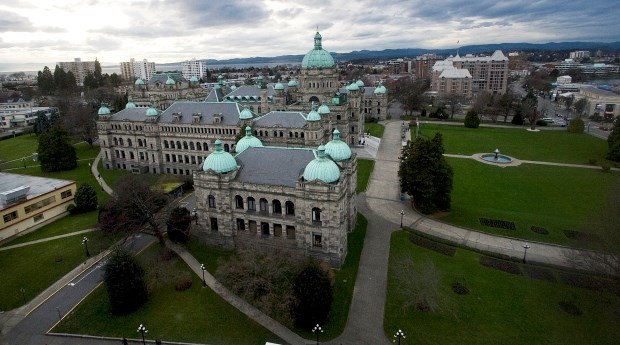 B.C. Finance Minister Carole James on Tuesday poured several pails of cold water on the province’s overheated real-estate market.
B.C. Finance Minister Carole James on Tuesday poured several pails of cold water on the province’s overheated real-estate market.
The NDP government unveiled a 30-point plan to make housing fairer and more affordable. About a third involve taxes, some designed specifically to penalize owners who leave properties vacant. The previous B.C. Liberal government was considered audacious in 2016 when it slapped a 15 per cent tax on foreigners buying real estate in Metro Vancouver, the first such surtax in Canada.
The NDP budget goes far beyond that. Although they were skeptical of the Liberal move at the time, they are hiking the foreign buyers’ tax to 20 per cent, effective Wednesday. The area it applies is also being expanded, to include the south Island, Nanaimo, the Fraser Valley and the central Okanagan. It will amount to $200,000 on a $1-million home, over and above the property-transfer tax.
This fall, another tax will kick in, aimed at domestic and foreign speculators who don’t live at the property they own and don’t pay taxes in B.C. The annual levy will cover the same regions as the increased foreign buyers’ tax, starting at $5 per $1,000 of assessed value and rising to $20 in 2019. It’s designed to encourage them to rent out properties if vacant, if they don’t just opt out and sell.
Also going up starting Wednesday is the standard property-transfer tax on high-end homes. It will be raised to five per cent from three per cent on homes worth over $3 million.
“Those who have benefited the most from the rising real-estate market should contribute their fair share,” said a budget document.
And starting in 2019, the school tax on homes over $3 million will be hiked as well.
“This is what a progressive tax system looks like,” said a backgrounder.
The collective impact will likely be to decimate, if not eradicate, foreign interest in the biggest real-estate markets in B.C. A foreigner buying an expensive home for investment purposes will have to ante up several hundred thousand dollars in extra taxes to do so.
The big question is whether it will make a difference to the vast bulk of the market, made up of domestic buyers. About four per cent of sales in the capital region involved foreign buyers last year.
That rate is expected to drop, as it did in Vancouver when the surtax was first imposed. Some market watchers expect the initial shock to sideline many foreign buyers. If they recover and regain interest later, that would spell policy failure.
It’s more likely the expensive series of penalties will make many of them lose interest permanently. But curtailing a small fraction of the demand — much of it at the higher end — might not be enough to achieve the goal of “moderating” mid-range prices so average-income people can afford homes.
Still on the free-wheeling tax theme, notice was served that the homeowner grant will be reviewed, so that owners and renters are treated equally. A $400 annual rebate to renters was initially promised by the NDP, but hasn’t materialized. Cutting the grant to homeowners instead would be another way to achieve fairness.
There are also several moves to improve the collection of existing taxes. With Attorney General David Eby raising continual alarms about real-estate corruption, steps will be taken to curb evasion and hidden ownership, close loopholes and stop money laundering.
A new speculator tax, an increased and expanded foreign buyers’ tax, and two more tax hikes for the $3 million-plus market bring the government to the edge of a balancing act. The federal government is already curbing mortgage accessibility, so prices might already be moderating. Easing the price spiral without taxing the market into a sharp correction is a tightrope walk for the government.
Four separate housing taxes staged over two years that are projected to bring in a half-billion dollars worth of extra revenue will go a long way toward determining exactly where the balancing point is.



